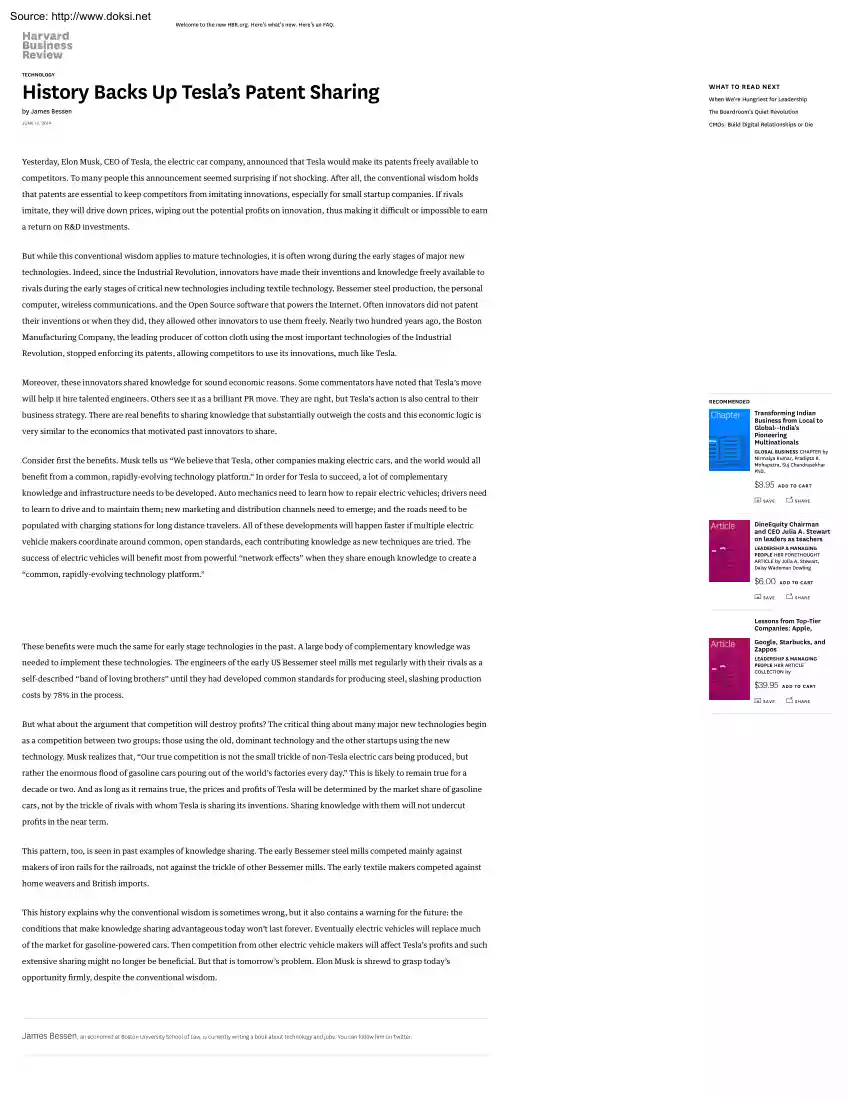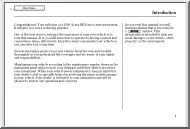A doksi online olvasásához kérlek jelentkezz be!

A doksi online olvasásához kérlek jelentkezz be!
Nincs még értékelés. Legyél Te az első!
Mit olvastak a többiek, ha ezzel végeztek?
Tartalmi kivonat
Source: http://www.doksinet Welcome to the new HBR.org Here’s what’s new Here’s an FAQ TECHNOLOGY History Backs Up Tesla’s Patent Sharing WHAT TO READ NEXT When We're Hungriest for Leadership by James Bessen The Boardroom's Quiet Revolution JUNE 13, 2014 CMOs: Build Digital Relationships or Die Yesterday, Elon Musk, CEO of Tesla, the electric car company, announced that Tesla would make its patents freely available to competitors. To many people this announcement seemed surprising if not shocking After all, the conventional wisdom holds that patents are essential to keep competitors from imitating innovations, especially for small startup companies. If rivals imitate, they will drive down prices, wiping out the potential profits on innovation, thus making it difficult or impossible to earn a return on R&D investments. But while this conventional wisdom applies to mature technologies, it is often wrong during the early stages of major new technologies.
Indeed, since the Industrial Revolution, innovators have made their inventions and knowledge freely available to rivals during the early stages of critical new technologies including textile technology, Bessemer steel production, the personal computer, wireless communications, and the Open Source software that powers the Internet. Often innovators did not patent their inventions or when they did, they allowed other innovators to use them freely. Nearly two hundred years ago, the Boston Manufacturing Company, the leading producer of cotton cloth using the most important technologies of the Industrial Revolution, stopped enforcing its patents, allowing competitors to use its innovations, much like Tesla. Moreover, these innovators shared knowledge for sound economic reasons. Some commentators have noted that Tesla’s move will help it hire talented engineers. Others see it as a brilliant PR move They are right, but Tesla’s action is also central to their business strategy. There are
real benefits to sharing knowledge that substantially outweigh the costs and this economic logic is very similar to the economics that motivated past innovators to share. Consider first the benefits. Musk tells us “We believe that Tesla, other companies making electric cars, and the world would all benefit from a common, rapidly-evolving technology platform.” In order for Tesla to succeed, a lot of complementary knowledge and infrastructure needs to be developed. Auto mechanics need to learn how to repair electric vehicles; drivers need to learn to drive and to maintain them; new marketing and distribution channels need to emerge; and the roads need to be populated with charging stations for long distance travelers. All of these developments will happen faster if multiple electric vehicle makers coordinate around common, open standards, each contributing knowledge as new techniques are tried. The success of electric vehicles will benefit most from powerful “network
effects” when they share enough knowledge to create a “common, rapidly-evolving technology platform.” RECOMMENDED Transforming Indian Business from Local to Global--India's Pioneering Multinationals GLOBAL BUSINESS CHAPTER by Nirmalya Kumar, Pradipta K. Mohapatra, Suj Chandrasekhar PhD. $8.95 ADD TO CART SAVE SHARE DineEquity Chairman and CEO Julia A. Stewart on leaders as teachers LEADERSHIP & MANAGING PEOPLE HBR FORETHOUGHT ARTICLE by Julia A. Stewart, Daisy Wademan Dowling $6.00 ADD TO CART SAVE SHARE Lessons from Top-Tier Companies: Apple, These benefits were much the same for early stage technologies in the past. A large body of complementary knowledge was needed to implement these technologies. The engineers of the early US Bessemer steel mills met regularly with their rivals as a self-described “band of loving brothers” until they had developed common standards for producing steel, slashing production costs by 78% in the process.
But what about the argument that competition will destroy profits? The critical thing about many major new technologies begin as a competition between two groups: those using the old, dominant technology and the other startups using the new technology. Musk realizes that, “Our true competition is not the small trickle of non-Tesla electric cars being produced, but rather the enormous flood of gasoline cars pouring out of the world’s factories every day.” This is likely to remain true for a decade or two. And as long as it remains true, the prices and profits of Tesla will be determined by the market share of gasoline cars, not by the trickle of rivals with whom Tesla is sharing its inventions. Sharing knowledge with them will not undercut profits in the near term. This pattern, too, is seen in past examples of knowledge sharing. The early Bessemer steel mills competed mainly against makers of iron rails for the railroads, not against the trickle of other Bessemer mills. The
early textile makers competed against home weavers and British imports. This history explains why the conventional wisdom is sometimes wrong, but it also contains a warning for the future: the conditions that make knowledge sharing advantageous today won’t last forever. Eventually electric vehicles will replace much of the market for gasoline-powered cars. Then competition from other electric vehicle makers will affect Tesla’s profits and such extensive sharing might no longer be beneficial. But that is tomorrow’s problem Elon Musk is shrewd to grasp today’s opportunity firmly, despite the conventional wisdom. James Bessen, an economist at Boston University School of Law, is currently writing a book about technology and jobs. You can follow him on Twitter Google, Starbucks, and Zappos LEADERSHIP & MANAGING PEOPLE HBR ARTICLE COLLECTION by $39.95 ADD TO CART SAVE SHARE
Indeed, since the Industrial Revolution, innovators have made their inventions and knowledge freely available to rivals during the early stages of critical new technologies including textile technology, Bessemer steel production, the personal computer, wireless communications, and the Open Source software that powers the Internet. Often innovators did not patent their inventions or when they did, they allowed other innovators to use them freely. Nearly two hundred years ago, the Boston Manufacturing Company, the leading producer of cotton cloth using the most important technologies of the Industrial Revolution, stopped enforcing its patents, allowing competitors to use its innovations, much like Tesla. Moreover, these innovators shared knowledge for sound economic reasons. Some commentators have noted that Tesla’s move will help it hire talented engineers. Others see it as a brilliant PR move They are right, but Tesla’s action is also central to their business strategy. There are
real benefits to sharing knowledge that substantially outweigh the costs and this economic logic is very similar to the economics that motivated past innovators to share. Consider first the benefits. Musk tells us “We believe that Tesla, other companies making electric cars, and the world would all benefit from a common, rapidly-evolving technology platform.” In order for Tesla to succeed, a lot of complementary knowledge and infrastructure needs to be developed. Auto mechanics need to learn how to repair electric vehicles; drivers need to learn to drive and to maintain them; new marketing and distribution channels need to emerge; and the roads need to be populated with charging stations for long distance travelers. All of these developments will happen faster if multiple electric vehicle makers coordinate around common, open standards, each contributing knowledge as new techniques are tried. The success of electric vehicles will benefit most from powerful “network
effects” when they share enough knowledge to create a “common, rapidly-evolving technology platform.” RECOMMENDED Transforming Indian Business from Local to Global--India's Pioneering Multinationals GLOBAL BUSINESS CHAPTER by Nirmalya Kumar, Pradipta K. Mohapatra, Suj Chandrasekhar PhD. $8.95 ADD TO CART SAVE SHARE DineEquity Chairman and CEO Julia A. Stewart on leaders as teachers LEADERSHIP & MANAGING PEOPLE HBR FORETHOUGHT ARTICLE by Julia A. Stewart, Daisy Wademan Dowling $6.00 ADD TO CART SAVE SHARE Lessons from Top-Tier Companies: Apple, These benefits were much the same for early stage technologies in the past. A large body of complementary knowledge was needed to implement these technologies. The engineers of the early US Bessemer steel mills met regularly with their rivals as a self-described “band of loving brothers” until they had developed common standards for producing steel, slashing production costs by 78% in the process.
But what about the argument that competition will destroy profits? The critical thing about many major new technologies begin as a competition between two groups: those using the old, dominant technology and the other startups using the new technology. Musk realizes that, “Our true competition is not the small trickle of non-Tesla electric cars being produced, but rather the enormous flood of gasoline cars pouring out of the world’s factories every day.” This is likely to remain true for a decade or two. And as long as it remains true, the prices and profits of Tesla will be determined by the market share of gasoline cars, not by the trickle of rivals with whom Tesla is sharing its inventions. Sharing knowledge with them will not undercut profits in the near term. This pattern, too, is seen in past examples of knowledge sharing. The early Bessemer steel mills competed mainly against makers of iron rails for the railroads, not against the trickle of other Bessemer mills. The
early textile makers competed against home weavers and British imports. This history explains why the conventional wisdom is sometimes wrong, but it also contains a warning for the future: the conditions that make knowledge sharing advantageous today won’t last forever. Eventually electric vehicles will replace much of the market for gasoline-powered cars. Then competition from other electric vehicle makers will affect Tesla’s profits and such extensive sharing might no longer be beneficial. But that is tomorrow’s problem Elon Musk is shrewd to grasp today’s opportunity firmly, despite the conventional wisdom. James Bessen, an economist at Boston University School of Law, is currently writing a book about technology and jobs. You can follow him on Twitter Google, Starbucks, and Zappos LEADERSHIP & MANAGING PEOPLE HBR ARTICLE COLLECTION by $39.95 ADD TO CART SAVE SHARE




